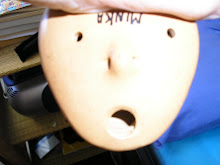(This was going to be a comment to Valerie's post: There's always something to learn..., on Jump on the Rollercoaster, but it grew, and grew.)
Is Autism a nail, or something completely different?
Is it a disease, mental illness, behavioural problem... curable, preventable, natural?
It's all so frustrating. Psychiatrists, psychologists, biologists - all merrily researching in their own separate directions.
They're all being theoretical, and we parents have to be practical. We're living it.
Sometimes I wish I could pack all the theorists into a big room, and not let them out until they talk to each other, swap their hammers and screwdrivers, and find the big picture. I'm sure it's there.
At the moment, I don't care so much about cure or prevention - I just want to know the cause(s). Then, we can decide what to do next.
If a child cannot read (general symptom), the underlying cause could be that the child cannot see at all, sees differently, processes language differently, is deaf, learns differently, speaks a different language, has been taught poorly... and in each case there is a specific treatment and/or intervention required to help the child to read.
If you don't know why the child cannot read, you are stabbing in the dark with interventions. Any one thing might work for some, but not others.
Give the whole non-reading class glasses, and you might get some miraculous successes, but for those who can already see, glasses won't help and may even do harm.
That's a clunky analogy, but the best I can think of this morning.
I've learnt to always look underneath a behaviour for the 'why'.
When he was little, my youngest was known as Cautious Curly. He didn't climb or run as recklessly as the others. He'd always hold the railing when climbing stairs. We thought it was just the way he was. His personality.
Nope. There was an underlying reason.
When he was 5, we discovered that he only had sight in one eye. That meant that he couldn't judge distances. And that explained the physical cautiousness.
That was a simple one. It's not curable, not fixable. It is understood and accommodated.
I want to find the 'why' for Dreamer's ASD.
I suspect that what is currently classified as ASD could turn out to be caused by multiple combinations and permutations of the biological, genetic, and environmental, which point to each of the various symptoms
that are found in the DSM. Which is why I want to lock all the researchers from the various fields into one room to swap notes.
I've never heard much disagreement on the saying that "if you've seen one ASD person, you've seen one ASD person". The mix of symptoms varies, and the severity of each symptom varies from person to person.
Can we tease them apart and look at them separately?
We are starting to hear more about sensory processing and auditory processing as separate issues. Allergies are understood to be real. Anxiety, obsessions and compulsions are recognised, but are defined again by symptoms not cause.
I wonder how they might be linked; is there one cause, or a separate cause for each; and why a certain group of people win the lotto with multiple disabling symptoms when others deal with mild single issues.
Maybe I wonder along these lines because I have three children, genetically similar, brought up in the same environment, yet so different.
Pass me the shovel, and I'll keep digging underneath the ASD umbrella for clues. Hey, theorists and researchers, wanna try a shovel instead of a hammer for a change?
Autism & Travel: Independence and Self-Regulation
2 months ago




I like the way you think.
ReplyDeleteI go through these phases every so often where I do a mental review of what I've read, heard and seen through this game, and the ones that make the most sense to me are the ones that point towards a biological basis and cause for autism.
There's nothing in my past that would lead me to accept this, but there's a hell of a lot in my everyday life.
:)
I too share your dream of throwing all the "experts" in a room and telling them to come up with something concrete, tangible, and real. NOW.
ReplyDeleteASD people are like snowflakes, each so unique. Some days I see my son as, pardon the bluntness, a complete mess of stuff all swirling and twisting at the same time. Other days, things are so mild.
It's so confusing.